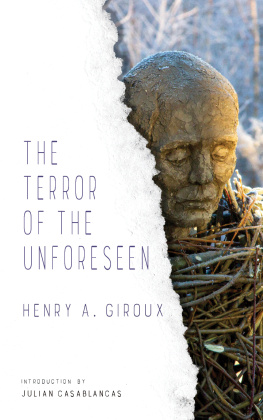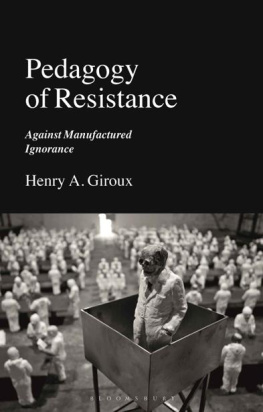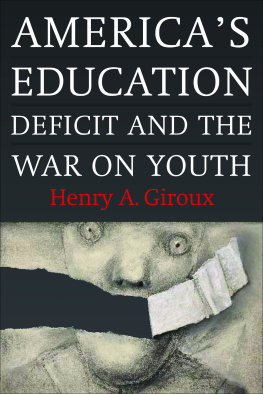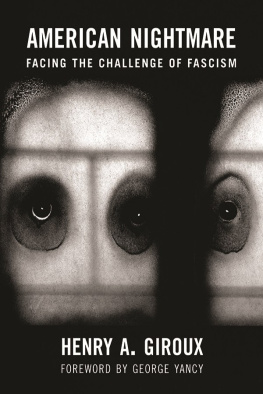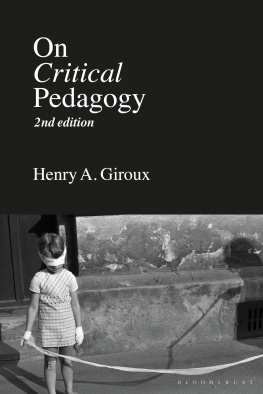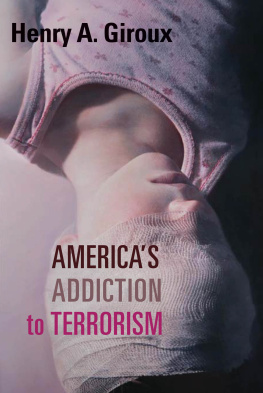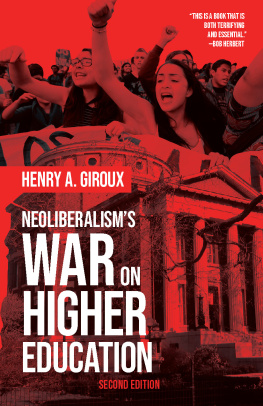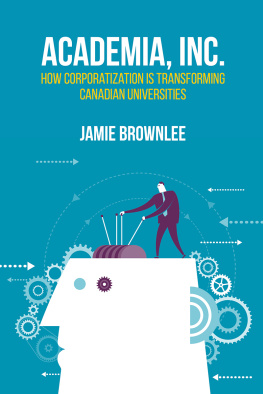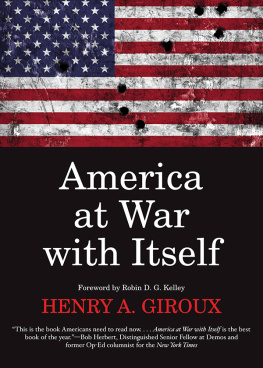The University in Chains
THE RADICAL IMAGINATION SERIES
Edited by Henry A. Giroux and Stanley Aronowitz
Now Available
Beyond the Spectacle of Terrorism: Global Uncertainty and the Challenge of the New Media
by Henry A. Giroux
Global Modernity
by Arif Dirlik
Stormy Weather: Katrina and the Politics of Disposability
by Henry A. Giroux
Left Turn: Forging a New Political Future
by Stanley Aronowitz
The Politics of Possibility: Encountering the Radical Imagination
edited by Gary A. Olson and Lynn Worsham
The University in Chains: Confronting the Military-Industrial-Academic Complex
by Henry A. Giroux
Forthcoming
Afromodernity: How Europe Is Evolving toward Africa
by Jean Comaroff and John L. Comaroff
First published 2007 by Paradigm Publishers
Published 2016 by Routledge
2 Park Square, Milton Park, Abingdon, Oxon OX14 4RN
711 Third Avenue, New York, NY 10017, USA
Routledge is an imprint of the Taylor & Francis Group, an informa business
Copyright 2007, Taylor & Francis.
All rights reserved. No part of this book may be reprinted or reproduced or utilised in any form or by any electronic, mechanical, or other means, now known or hereafter invented, including photocopying and recording, or in any information storage or retrieval system, without permission in writing from the publishers.
Notice:
Product or corporate names may be trademarks or registered trademarks, and are used only for identification and explanation without intent to infringe.
Library of Congress Cataloging-in-Publication Data
Giroux, Henry A.
The university in chains : confronting the military-industrial-
academic complex / by Henry A. Giroux.
p. cm.
Includes bibliographical references and index.
ISBN 978-1-59451-422-7 (hardcover : alk. paper)ISBN 978-1
-59451-423-4 (pbk. : alk. paper) 1. Education, HigherPolitical
aspectsUnited States. 2. Higher education and stateUnited
States. 3. Education, HigherAims and objectivesUnited States.
4. MilitarismUnited States. I. Title.
LC89.G53 2007
378.73dc22
2007010323
Designed and Typeset by Straight Creek Bookmakers.
ISBN 13 : 978-1-59451-422-7 (hbk)
ISBN 13 : 978-1-59451-423-4 (pbk)
For Susan, without end
For Zygmunt Bauman, with great admiration
To the memory of Grizz
Contents
I want to thank Susan Searls Giroux, Sophia McClennen, Doug Morris, Donaldo Macedo, and Christopher Robbins for providing me with a number of critical insights and suggestions that otherwise would not have been in The University in Chains. While I am solely responsible for the book, their critical input was invaluable in helping me think through various ideas that I take up and develop. I also want to thank Howard Zinn, Stanley Aronowitz, Jasmin Habib, Ira Shor, Olivia Ward, Nasrin Rahimieh, Peter Mayo, Giles Gherson, Joseph A. Massad, David Theo Goldberg, Brian McKenna, Nick Couldry, John Comaroff, Doug Kellner, Zygmunt Bauman, Lewis Gordon, Lawrence Grossberg, Roger Simon, Carol Becker, Ken Saltman, Paul Street, Max Haiven, and Scott Stoneman for their critical input. Grace Pollock, my invaluable graduate assistant of the last three years, did an excellent job in editing the manuscript and in helping me research the book. My administrative assistant, Maya Stamenkovic, saved my sanity on numerous occasions with her research and administrative skills. She outdid herself in the help she provided me in finishing this book. I also want to thank my long-term editor and good friend, Dean Birkenkamp, who has been a great critic and supporter of my work. His advice on how to organize this book changed the project significantly and helped produce a much better book. I want to thank Christine Arden, once again, for her superb copyediting. Grizz, my canine companion of ten years, died in 2006, but shared his remaining warmth and love for half the time I was finishing the book. I will miss him terribly. For inspiring my hope for the future, thanks go to my three boys, Jack, Chris, and Brettso dear to my heart and yet so far away. Our new canine housemate, Kaya, has been a great joy to have these last few months and brings a smile to my face every time I open the door and see her joy and love. Having her lie under my desk while I finished the book surely helped make the task easier. And, of course, I want to acknowledge all of those university professors, students, and educators who are on the frontlines of one of the most important struggles of our timetaking risks to make learning matter and the future better. Once again, I also want to thank my incredible partner, Susan, who never fails to inspire me with her warmth, sparkling intelligence, great love of music, and utterly seductive presence. Finally, I hope Ellen Willis would have been proud of this book. I will miss her generosity, worldliness, warmth, and razor-sharp intelligence. An earlier version of appeared in College Literature and is used with permission.
The undiminished presence of suffering, fear and menace necessitates that the thought that cannot be realized should not be discarded.
Theodor Adorno
What is the task of educators at a time when the forces of democracy appear to be in retreat and the emerging ideologies and practices of militarization, corporatism, and political fundamentalism bear down on every aspect of individual and collective experience? How one answers this question will have a grave impact not only on higher education but on the future of democratic public life. There are no simple solutions. Hence it becomes crucial, particularly for educators, to provide alternative democratic conceptions of the meaning and purpose of higher education and its relationship to the larger political order, assessing the corporatist and militaristic tendencies within both the university and the wider society. The University in Chains argues that both the academy and democracy are in peril, that a fundamental assault has been launched on the academys unfulfilled legacy of democratic education and its present and future role as a democratic public sphere. But the rigid ideological, economic, and religious chains that are now engulfing higher education so as to eliminate critical thought, noncommodified and nonmilitarized students to engage in a culture of questioning, a pedagogy of critical engagement, and a democratic politics of civic responsibility. In part, this suggests connecting higher education to educational projects that enable the development of social movements, public spheres, and groups of critical citizens that are able not only to challenge the ascendancy of a number of dangerous anti-democratic tendencies in the United States but also to address what the democratic role of higher education might be within a post-9/11 world. This is an awesome responsibility, yet higher education can play a key role in reclaiming the frayed relationship between education and democracy, knowledge and engaged citizenship, and learning and an informed citizenry.
The crisis in American democracy has been heralded and exacerbated by the nations growing insecurity about its place in the world, the hollowing out of the state as a provider of crucial social supports, the rise of the millennial military state,
An incessant assault on critical thinking, a trampling of civil liberties by right-wing politicians, a manufactured public culture of in/security that serves to mystify all-too-real vulnerabilities, and an all-embracing commitment to free-market fundamentalism that undermines the purposeful social relations in which university educators work, if not the very concept of the social itself, have undercut the possibility for thinking anew about how vital social institutions can be defended as public goods. Moreover, as socially conscious visions of equity recede from public memory, unfettered brutal self-interest and greed combine with retrograde social policies to make security and safety a top domestic priority, fueling a panic-driven culture of fear and an increasingly powerful military-industrial-academic complex. Patriotic correctness, consumerism, and militarization have become the most powerful trilogy of forces now shaping education, redefining the meaning of citizenship, and establishing the contours of an authoritarian social order. As the spaces for producing engaged citizens are stripped of their critical capacities, commercialized, and militarized, a culture of consent, fear, terror, and paranoia emerges to further fuel the growing authoritarianism of U.S. society.


